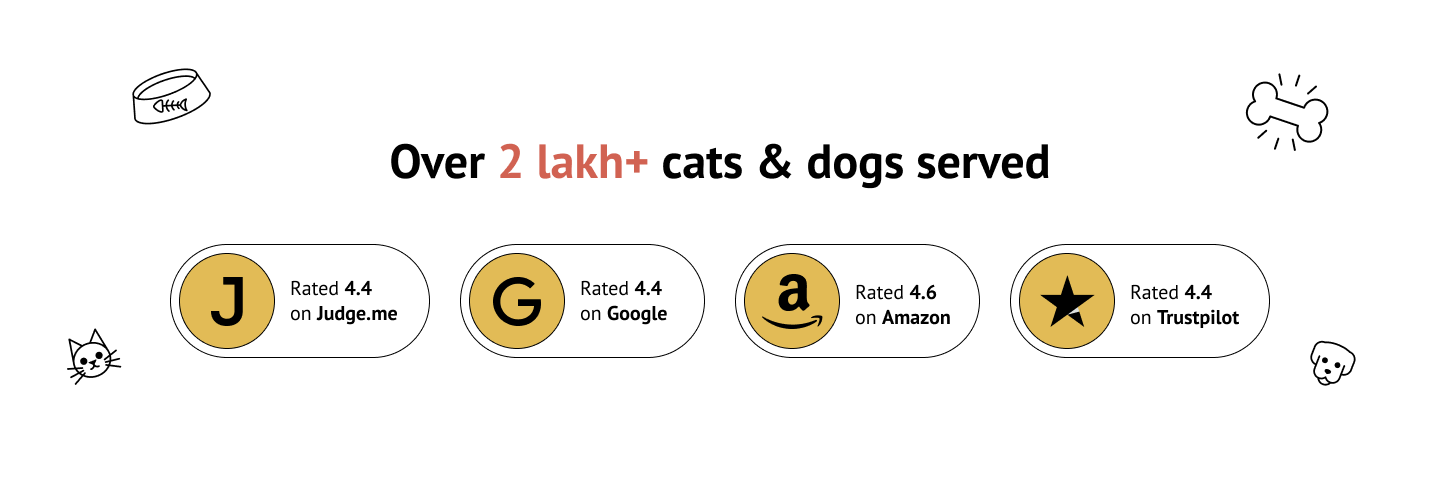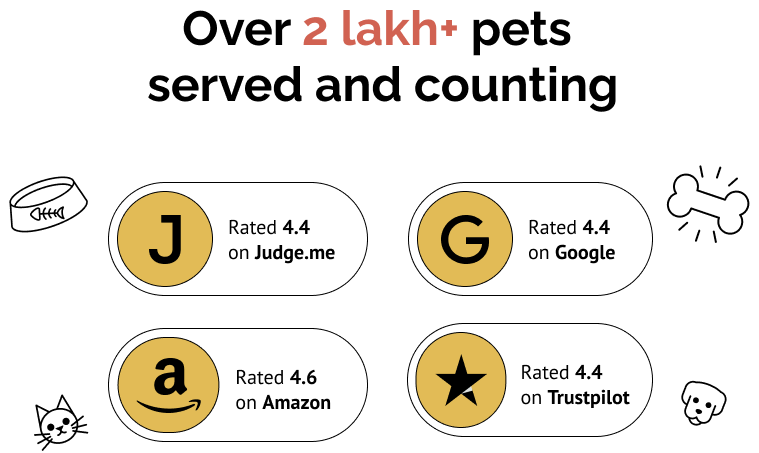Human foods that cats can eat
Is it okay if my cat eats this? - a mind-boggling question all cat owners across the world finds themselves pondering about. As we spend our days with feline friends, it just so happens that we find ourselves pondering on whether or not to feed them human food. While there are many human foods that cats can benefit from, some can cost them their lives. Hence, we need to know what we can feed them. Before looking into human food, every cat owner must know that cats are obligate carnivores - they need meat in their diet to stay healthy. There exists no such thing as a vegetarian diet for a cat, even cats on the verge of obesity are fed lean meats. Cats derive nourishment from what is called a calorie-dense meat-based diet. Vegetables, fruits, and dairy products can be fed once to thrice a week, while carbohydrates, sugars, and fats are an absolute no.
Here are the foods that cats can eat - some to gorge on, some in moderation, and some solely as a treat.
Carrots - Cats can eat carrots everyday, irrespective of whether they take a liking to it. When cooked, carrots can be fed as a cat treats or added to a meal. Carrots enhance cardiovascular, neural, digestive, and muscular health in cats. They are known to support the immune system and fight cancer. If your cat doesn't like the taste of carrot, opt for commercially available cat food enriched with carrots. However, if your cat does enjoy the taste of it, add mashed or diced pieces of cooked carrots to a meal.
Bread - Before all else, bread must be used solely as a snack. Bread is carbohydrates and carbohydrates are to be fed in moderation to cats. At best, the only thing cats derive from bread is a smear of extra energy.
Apples - As good as it is for us, it is for them. Although they do not need a whole apple every day, slices of the fruit are good sources of vitamin C, helping to keep infections at bay. Apples aid better digestion and reduce the chances of them developing a dangerous bone disorder called osteoporosis.
Spinach - Spinach is of immense benefit to cats, but needs to be fed in moderation. Spinach is rich in Vitamins A, K, C, calcium, and iron but because of its high oxalic acid content, spinach when given more than twice a week, predispose cats to develop bladder stones.
Beans - This is a vegetable that is chock-full of vitamins, minerals, and fibre. They're excellent sources of iron, zinc, magnesium, and potassium - known to improve cardiovascular health and optimise brain function. Some cats experience gas or bloating after eating beans; that's why check with your veterinarian and your cat before you add it to their meal.
Bananas - This is one of the few fruits that are good for cats and most often enjoyed by them too! Bananas are plentiful sources of potassium and fibre. They keep a cat's digestive and gut in good health besides being extremely beneficial to improving brain function. As the downside of every good food, bananas are high in sugar. It should make up for only eight per cent of a cat's daily diet - add pieces of mashed banana to your cat's meal ever three to four days.
Broccoli - This tree-like vegetable is never among the top ten vegetables, but it is bountiful when it comes to ringing in good health. Broccolis regulate cardiovascular health and improves nerve function because of their high vitamin C, K, potassium and iron content. Above all else, it is known to be a prominent fighter against cancer cells. Since cats dislike the vegetable, broccoli can be fed with strained meat soup.
Chicken - An all-time favourite - chicken is a top favourite it any cat household. Almost all commercially available cat food has chicken in sufficient amount for cats. Chicken can be fed every day - it provides the necessary nutrition for a healthy heart, sharp vision, and a robust reproductive system. Feed cats cooked chicken instead of raw or at times spoiled chicken. Cheese - Cheese can be fed to cats in small amounts as a snack. Cats find it hard to digest cheese because cats don't have the enzyme lactase that helps digest milk products like milk and cheese. Feed your cat cheese in tiny amounts only if she shows a liking towards it - you wouldn't want kitty developing stomach problems!
Curds - Unlike in milk and cheese, lactose is already broken down in curds. You can feed your cat curds in moderate amounts without having to worry about an upset tummy. Curds is an excellent source of calcium, protein, prebiotics, and probiotics.
Eggs - Eggs provide essential protein and B vitamins and are safe to feed in moderate amounts. Ensure you cook the egg before feeding it to your cat because raw eggs sourced from unknown places can have E.coli and Salmonella - both extremely dangerous to cats.
Fish - There might not be a cat that doesn't like fish! Almost all commercially available cat food brands have cat food with different kinds of fish - salmon, tuna, herring etc. Fish is a good source of protein and omega-3. If you choose to feed fish that is cooked at home - cook the fish thoroughly in coconut oil before giving it to your cat.
Oatmeal - Some cats like oatmeal, while some do not. If your cat takes a liking to oatmeal, feed it to him only in small amounts. Oatmeal is a good source of energy and vitamins but can be done away with for cats who do not like it.
Watermelon - Seedless watermelon without the rind is an excellent source of vitamin A and C. Feed cats watermelon slices on those hot summer days to keep cool! Tofu - Since tofu is made from soy lactose, it does not cause digestive problems like dairy products. Feed your cat tofu as a snack or treat and, not as a substitute for meat in their diets.
Rice - Cats must not be fed rice every day without meat and vegetable. It can cause malnourishment which then predisposes a cat to several medical problems.



















Leave a comment